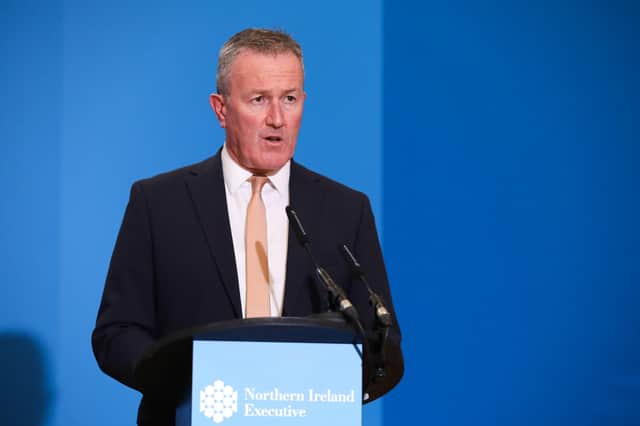Conor Murphy: Low productivity in Northern Ireland is a symptom of its ties to Britain’s macro-economy


(See below for a link to Peter Robinson’s column ‘SF finance minister’s fiscal policy is to hold out his hand for more UK cash’)
This good advice is quickly ignored by Mr Robinson who accepts without question Rishi Sunak’s claim that the Executive is receiving an extra £1.6bn.
Advertisement
Hide AdAdvertisement
Hide AdThis figure is based on what the Treasury considers to be the Executive’s baseline. It is a technical accounting exercise which does not reflect what the Executive actually spends.
The reality is that compared to this year’s budget of £12.48bn, the increase in day to day spending is £450m next year, £670m the year after, and £866m in year three. Once inflation is taken into account this cash increase actually represents a flat budget over the period.
The former DUP leader claims that Sinn Féin fiscal policy is simply to seek for money from the Treasury. I have no qualms in stating my belief in world-class public services and my opposition to the austerity policies pursued by the British Government over many years.
However part of my fiscal policy is to lessen reliance on the block grant. That is why I have set up a Fiscal Commission to examine the potential for more local control over tax and spending.
Advertisement
Hide AdAdvertisement
Hide AdIn contrast Mr Robinson champions what he describes as “subsidies” from the Treasury which shows “the benefit of our fiscal union as part of the UK”. In essence Robinson argues that the north is so weak economically it is dependent on the British Government’s largesse.
That is a remarkable statement from the only party that has led the economy department since devolution was established. But in fairness to him there is no doubt that the DUP’s performance in the economy department has been utterly lamentable.
It excelled at photo opportunities, confidently talking the language of the business community, keeping people close to the party on board, and creating the appearance of success. But the fundamental economic problem of low productivity went unaddressed.
It is also the case that this region’s low productivity is a symptom of its ties to Britain’s macro-economy, which has long been characterised by low productivity and therefore low growth.
Advertisement
Hide AdAdvertisement
Hide AdMeanwhile the south has one of the most productive economies in the world. That is why a number of studies have shown that Irish Unity would unshackle the north’s economic potential and unleash growth, quickly eliminating the deficit.
That is the increasingly stark economic choice facing people in the north.
We can continue to be a peripheral part of a sluggish British economy, dependent on policy decisions made in London which includes pursuing the economic self-harm of Brexit. Or we can be a core part of a dynamic, highly productive all-Ireland economy within the EU, the largest market in the world.
• Conor Murphy is a Sinn Fein MLA and Northern Ireland’s finance minister
Advertisement
Hide AdAdvertisement
Hide Ad• Peter Robinson Oct 29: SF finance minister’s fiscal policy is to hold out his hand for more UK cash
——— ———
A message from the Editor:
Thank you for reading this story on our website. While I have your attention, I also have an important request to make of you.
With the coronavirus lockdowns having had a major impact on many of our advertisers — and consequently the revenue we receive — we are more reliant than ever on you taking out a digital subscription.
Subscribe to newsletter.co.ukand enjoy unlimited access to the best Northern Ireland and UK news and information online and on our app. With a digital subscription, you can read more than 5 articles, see fewer ads, enjoy faster load times, and get access to exclusive newsletters and content.
Visit
to sign up
Advertisement
Hide AdAdvertisement
Hide AdOur journalism costs money and we rely on advertising, print and digital revenues to help to support them. By supporting us, we are able to support you in providing trusted, fact-checked content for this website.
Ben Lowry, Editor